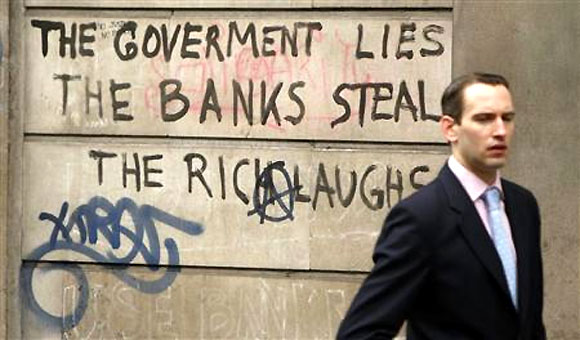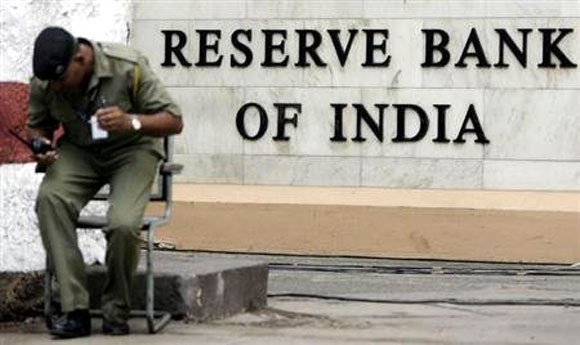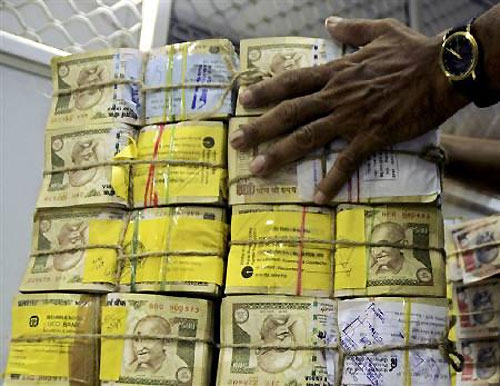 | « Back to article | Print this article |
Protecting customers from 'banksters'
The RBI must apply its mind to the heart of the issue: are bankers competent to advise customers on anything other than their own banking product?
You cannot live life without banks. You may or may not need mutual funds or insurance products, but you need banks. And banks have a fiduciary responsibility to their customers. If there is one person who knows exactly how much is there in your bank account, it is your banker.
You trust him. For decades banks were in the business of collecting deposits and holding them in trust. No longer. Banks still want your money, but not necessarily lying with them as deposits.
After paying you 8.5 per cent on a one-year fixed deposit, they earn only a few percentage points on your money. Banks make much more if they manage to sell you insurance plans or "wealth management services", which allow them to buy or sell your mutual fund investments every few weeks or sell you unregulated products such as art funds.
The commissions and incentives from these products are much more than the money made on your deposits. Under that lure, the staid, trustworthy banker - especially from private sector banks - has turned into a hustler hawking third-party products.
The riskier the product, the higher the commission. The higher the commission, the greater the scope of mis-selling. That is why a 79-year-old is sold a five-year locked-in mutual fund, or a 60-plus retiree is sold a unit-linked insurance plan, which requires hefty premium payments to be made for a few years before making any returns. The menace is so widespread that bankers are now being referred to as "banksters".
Protecting customers from 'banksters'
Indeed, from Australia to the United States, for the first time, regulators are trying to put in place a new structure and a set of rules that will protect the buyers of financial services, rather than the sellers. Indian buyers have had no such luck; there is little discussion about consumer financial protection in the country.
Such a structure and rules would have to serve local challenges. The biggest challenge for the mass-affluent segment (the readers of this paper) is dealing with mis-selling by banks.
Indians are hardly investing in stocks and mutual funds directly. Since the RBI has so far taken a hands-off approach to regulating the distribution of third-party financial products by banks, the mis-selling is usually done by them.
Rules: The RBI's rules of distributing financial products are dismissed in a master circular covering "para-banking".
The circular only suggests that banks follow know your customer and anti-money laundering laws and "disclose to the customers, details of all the commissions/other fees (in any form) received". It doesn't even suggest that they should follow practices that are fair to customers.
The RBI issued a separate master circular on customer services in July last year, a 95-page clerical masterpiece that even includes a "Format for Comprehensive Notice Board" at the branches.
But not a word about distribution of third-party products; as though malpractices in such distribution don't even exist. By the way, the RBI does not even mandate that banks should not sell unregulated products. The RBI has promoted something called Banking Codes and Standards Board of India. BCSBI has a 39-page banking code on customer services.
There are two small problems with it: one, the code is voluntary; and two, there is not a word in it about ethical selling of third-party products. The RBI's message to banks: mis-selling is not an important issue to the regulator.
Click on NEXT for more...
Protecting customers from 'banksters'
Redress: With that as the message, banks are having fun. What, then, does a customer who is a victim of mis-selling do? There is something called the banking ombudsman, but this office handles only cases that are under a value of Rs 25 lakh (Rs 2.5 million).
By the way, according to the Securities and Exchange Board of India rules, the minimum investment a portfolio management scheme can accept is Rs 25 lakh. Clearly, the ombudsman will not touch a large part of mis-selling by wealth management services. Consumer courts are not always equipped to handle these cases, and awarding compensation is a tedious process.
I can go on about the alarming lack of application of the mind on display here, but let me get to some solutions - since the RBI has promised to come out with some circulars regarding wealth management services by the end of June.
Onus on banks: If we discard the senseless "caveat emptor" doctrine for financial products and put the onus of selling products appropriate to customers on banks, accompanied by strong penalties, mis-selling will reduce drastically.
The selling process: There must be specific sign-offs by customers on all clauses denoting risk factors. If products don't come with clear risk factors written in plain English, banks should not sell them.
Paper trail: Banks must be made responsible for creating proof and trail emails/hard copies when relationship managers/tellers accost customers at home or at the bank.
Click on NEXT for more...
Protecting customers from 'banksters'
Compensation: Since the onus of proving the appropriateness of products must be on bankers, there must be detailed, specified penalties and compensation when mis-selling is established.
Finally, the RBI must apply its mind to the heart of the issue: are bankers competent to advise customers on anything other than their own banking product? The RBI has no rules that monitor a banker's capacity to offer investment advice in any manner.
The single largest group of consumers of financial services is bank depositors; but while formulating policies, customers are never involved.
The Indian Banks' Association, the bankers' lobby, has a strong voice and presence in such policy formulation. By the end of June we will know whether this bleak consumer protection scenario for bank customers can change.
The writer is the editor of www.moneylife.in.




